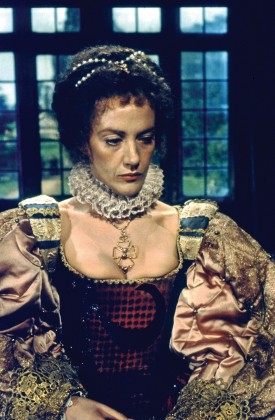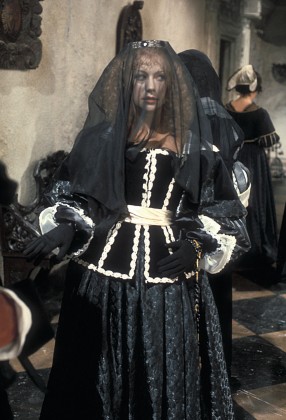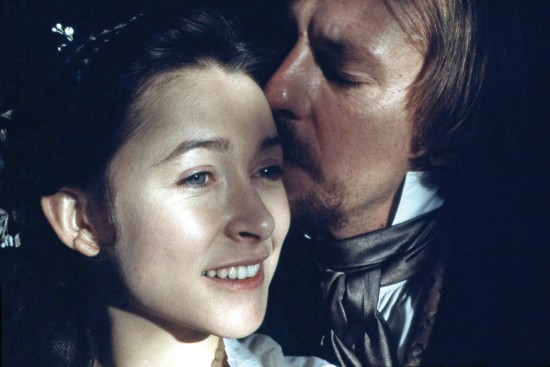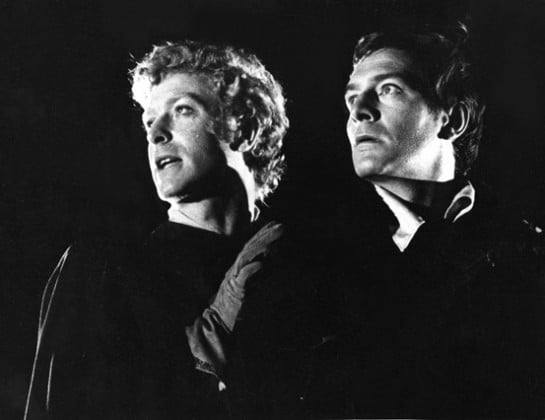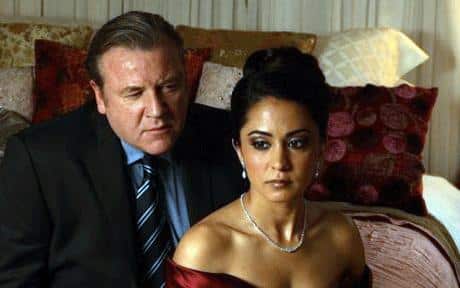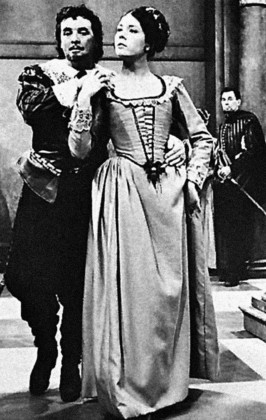 A series of six Classic plays adapted for television and screened at the BFI South Bank 25th March until 29th April 2013:
A series of six Classic plays adapted for television and screened at the BFI South Bank 25th March until 29th April 2013:
Women Beware Women 1965 25 March
Hamlet At Elsinore 1964 1 April
The Duchess Of Malfi 1972 10 April
Tis Pity She’s A Whore 1980 18 April
The Changeling 1993 26 April
Compulsion 2009 29 April
[youtube id=”uKBodtX7n4w” width=”600″ height=”350″]
Q & A with Curator John Wyver as MC, Director Greg Doran and actress Dame Diana Rigg, who played Bianca in Women Beware Women.
Greg Doran is the current Artistic Director of the RSC.
Curator John Wyver is employed to document all the plays on TV, as funded by AHRC and University of Westminster. He has produced Hamlet, Macbeth and Julius Caesar and won a Bafta and in International Emmy for his work.
JW- can I start with you, Greg. How do you feel Thomas Middleton suits television?
GD: Very well.. there’s a simplicity that suits TV more than the denser texts with longer sentences…
JW: Dame Diana, how was it for you?
DR: I feel relieved. I’ve never seen it before, but I was relieved, (director) Gordon Flemyng made us zip through the text and pick up cues. The wit and irony is all there… I was pleased. And relieved.
JW:- Do you recall making it?
DR: No. [laughter] In those days, it was the early days and there were no retakes. We just ran with it.
JW: What was the sense of being at the RSC at that time and then doing television?
DR: Well, TV at the time was considered very much the poor cousin.
JW: Was it a difficult decision to do?
DR: t was a job. And you were being paid considerably more than at the RSC. Of course, it’s never about money for an actor, it never is but… it was a job and TV was a new thing. But now of course, it has changed and rightly so.
JW: What did you make of seeing yourself?
DR: I was pleased with my performance… We got through it. It was well directed.. I was very young. I was 24.
DR: I wondered how much they had cut.
JW: – well, quite alot.. there’s Nothing of the Cardinal. The religious aspect is almost entirely missing. Many speeches are half or a third of there length and Mackie modernised the language, but he has kept the ideas and the substance…
GD- I can see why the play gained its moment in the 60’s. The women’s parts are fantastic. Bianca, Livia and Isabella… The RSC had revised the play in 1962 and did a season of plays there. Then there was a TV version and then in 1969, it was revived again. I think it is regarded as one of the Great Jacobean plays. But the simple reason is that there are so many plays that are good, but not done, simply because they are not done. [laughter]
DR- I’m fascinated by this quantum leap between Shakespeare and Middleton- a huge leap into something how and why did they get there?
JW- Is it a big leap?
GD:-I think it is familiar, but why they resonate is that they have a similar world view. The gunpowder plot was a [game-changer]. If you can destroy parliament and the entire royal family in one fell swoop… I think we were tipped into a sense of dislocation. In Shakespeare, you get the ‘abyss’, he makes us stare into it, but Middleton gives us a sort of punk reaction. And that’s what we get in the final scene (of Women Beware Women)- How many can we kill and in how many different ways? In a way it has similarities to Hamlet, but with it; an esprit.
DR: It crosses every single line. Crosses class lines, incest… fascinating. You don’t need to flesh Jacobean drama. Get on with it.
JW: And the excess of the drama itself..?
DR: Well, what have we got theses days? We’ve got Tarantino… still massive emotions, gallons of blood.. you have to handle excess with exquisite taste.
GD:- Moral sententia; we enjoy wickedness and plotting and how that plays off each other at the end…
DR:- Parables wrapped up in hyper-drama and it is exquisitely written. The director got on with it and the wit was presented to you, no one dwelt on it, it was there and if you wanted to pick it out it was there for you.
JW:- Is there a way of doing this for contemporary audiences now? Is there something missing from TV now?
GD:- Well there’s no reason why they can’t be. They do resonate; a sense of being in a society that has lost its moorings. There are alot more of these plays that we haven’t rediscovered. There is not always a valid reason for why they haven’t been done. Comedies are harder to do than tragedies. In tragedies, the wit comes over very well. Comedies need a sense of communal celebration, which can be missing from TV rather than in theatre performance.
JW:- opening out to the audience. Any comments or questions?
Audience: Middleton was very good at intimate dialogue between men and women…
DR:- Women had not had a place on the stage for very long… this period gave women all the qualities fully-rounded characters that were missing before.
JW- …even though they were still being played by boys at this time.
Audience: Turning to the camera works very well for the asides… an intimacy that TV really does well. We hardly see this on TV now.
DR: Miranda does it. In a different context. But very well- Turns to the camera and goes ‘this is shit’. [laughter]
Doran- House of Cards did it very well too, Urquhart does it very well, confiding in the camera.
Audience:- Great to see the three-camera technique used. You could actually rehearse back then. Now, there’s a minimal rehearsal, as there’s no time. There may be more takes, but they usually only happen for technical reasons, rather than for the actors. Years ago you could have an initial reading with the whole cast there. I say bring that back, that process of the three camera filming!
DR: The tracking shots were So impressive. Alot of them, particularly at the beginning. That opening bravura shot of the actor walking along and picking up the other couple.
JW- also the use of depth of frame; characters close up in the frame and others in the deep background was very good.
Audience- The pacing was excellent. Was that an atypical narrative?
JW: We think of television of that moment as rather crude and hopefully we can see a richness there that we can see and celebrate…
DR:- It was an achievement of its kind and in its time, but it still has relevance now.
AT- Greg, do you feel that soaps have somehow in recent years gone down the direction of these old melodramas? I mean, these days when an actor is leaving the soap, they always set them on fire or blow them up…
Doran- Yes, I think so too. I was watching (Women Beware Women) thinking this could be an episode of EastEnders. But they might do well to go back to these old Masters and learn from them in terms of writing…
In conversation with Filmuforia, Curator John Wyver then had this to say concerning the season:-
I’m both a producer of art programs and of ‘performance’ films, but I’m also interested in the history of TV and of theatre plays on TV, documenting all of them since 1930 and this BFI season came out of that.
Last year in conjunction with the BFI, we did the Greek tragedies, which went really well, lots of interest and good audiences. So this was really a follow up. I was interested in exploring the plays of Shakespeare’s contemporaries, even though there weren’t alot of them.
I want to highlight some of the great work done putting these wonderful plays on TV. I want to celebrate that. I’m interested in having them more available to people. Be it academic, as plays, as television… I feel discussions of theatre-produced plays tend to be strongly remembered and extensively written about, but when on television, they get overlooked and not written about, or studied so much and I wished to redress this balance.
It’s just a very different form of TV… not better, but different.
There’s a strength in capturing and portraying performance across 20-30 minute takes and I am interested in the link that is there between quite theatrical TV and say, the RNT doing theatre plays transmitted live onto cinema screens.
There is however, a very small body of plays that are available, which is why I picked what I picked. I’m trying to procure some DVD releases, but it is quite difficult with rights issues with the BBC and it all takes a long time. But that’s why we’re here…
Part of the academic research is to build a database of the work that exists and raise the profile on TV. It’s all about trying to get more awareness of the richness of these works both as TV and as plays.
I just want more people to see them and know about them, so thank you for your interest in helping us to spread the word. AT
THE JACOBEAN TRAGEDY FOR THE SMALL SCREEN SERIES RUNS FROM 29TH MARCH THROUGHOUT APRIL 2013 AT THE BFI LONDON

